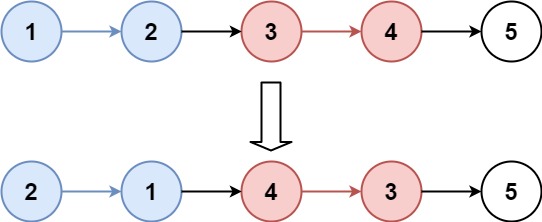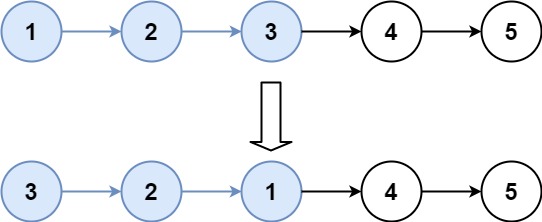動機
之前寫的很爛,居然還用到例外!? 所以重寫
Problem
Given a linked list, reverse the nodes of a linked list k at a time and return its modified list.
k is a positive integer and is less than or equal to the length of the linked list. If the number of nodes is not a multiple of k then left-out nodes, in the end, should remain as it is.
You may not alter the values in the list's nodes, only nodes themselves may be changed.
Example 1:

Input: head = [1,2,3,4,5], k = 2Output: [2,1,4,3,5]
Example 2:

Input: head = [1,2,3,4,5], k = 3Output: [3,2,1,4,5]
Example 3:
Input: head = [1,2,3,4,5], k = 1Output: [1,2,3,4,5]
Example 4:
Input: head = [1], k = 1Output: [1]
Constraints:
- The number of nodes in the list is in the range
sz. 1 <= sz <= 50000 <= Node.val <= 10001 <= k <= sz
Follow-up: Can you solve the problem in O(1) extra memory space?
Sol
這題其實把reverse,a到b的部分寫出來就幾乎完成了,可以看這裡有解釋
剩下就是把group的起終點找出來再丟到reverse就ok了
def reverseKGroup(self, head: ListNode, k: int) -> ListNode:
def rev(a,b): # [a,b)
ptr = a
ptr_next = a.next
a.next = None
while ptr_next is not b:
tmp = ptr_next.next
ptr_next.next = ptr
ptr = ptr_next
ptr_next = tmp
return [ptr,a] # head, tail
group_head = head
prev_group_tail = None
ret = None
while group_head:
group_tail = group_head
for _ in range(k):
if not group_tail:
return ret if ret else head
else:
group_tail = group_tail.next
h,d = rev(group_head,group_tail)
if not ret:
ret = h
else:
prev_group_tail.next = h
d.next = group_tail
group_head = group_tail
prev_group_tail = d
return ret